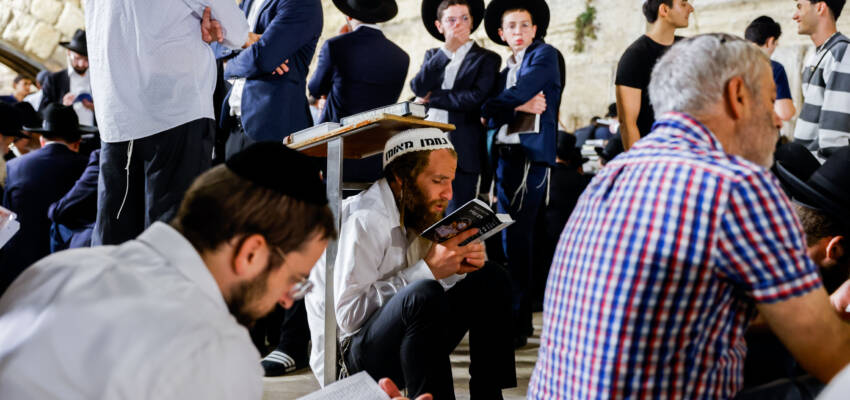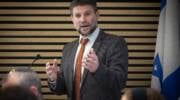The destruction of the Temple was a loss as real and as searing as death. But unlike death, it is reversible.
By Sara Yoheved Rigler, Aish.com
I remember with perfect clarity the sensation of waking up on the morning of March 9, 1990. In those first few fuzzy moments of consciousness, I oriented myself to where I was – in the spare bedroom of my parents’ New Jersey apartment, and what day it was – two days after my father’s death. As soon as I realized that I had woken up into a world without my father, my heart plunged into a fathomless grief, like waking up into a nightmare that will never end.
The world without my father was not simply the same world minus one; it was a totally different world. This altered, diminished world lacked the stability and goodness that was my father. This world wobbled on its axis; its gravitational pull was heavier.
It took me a year to adapt to this new world, to learn to navigate its emotional byways. Now, more than fifteen years later, I’ve become proficient at maneuvering in this World-Without-My-Father, but it is not and will never be the same world in which he was so benevolently and lovingly present.
The ninth day of the Hebrew month of Av – called Tisha B’Av – is to the Jewish people what March 9 was to me. We misrepresent the tragedy of the day by describing it as the destruction of the two Holy Temples, as if the catastrophe is the loss of a building. The American people do not mourn on 9/11 because of the destruction of the Twin Towers; they mourn the thousands of lives lost in the conflagration. Contrast a person who mourns the absence of the majestic towers to the New York skyline with a person who mourns the loss of his/her parents caught on the 98th floor.
Tisha B’Av is more like a death than a destruction, because on that day the world changed irrevocably.
The world without the Holy Temple is not the same world minus one magnificent structure. The world without the Holy Temple is a totally different world. The Holy Temple was the mystical vortex between the higher, spiritual worlds and this gross, physical world. The Temple service was an elaborate mystical procedure that kept the aperture between the worlds open and functioning. The Divine Presence manifested itself in the Temple and through the Temple. When the Temple was destroyed, that palpable Divine Presence removed itself from our world. It was a loss as real and as searing as death.
My son was born into a world without my father. He will never know how the room lit up when my father entered, how secure and supported dozens of people felt because of the bedrock that was my father.
In the same way, we who were born into a world without the Divine Presence have never experienced the spiritual luminosity that radiated through the aperture of the Holy Temple. We live in a dimmer, coarser world, where physical reality seems like ultimate truth while spiritual reality seems like a vague phantasm. We navigate in the nightmare without even knowing we’re in it.
Divine Immanence
In the first Holy Temple, ten miracles were constant for all to see. Among them were that no matter how the wind was blowing, the smoke from the altar always went straight up and that no matter how packed the crowds of people were, at the point of the service that required everyone to prostrate, there was always sufficient room. Anyone who visited the Temple could see these miracles, these deviations in the laws of physics, simply by entering the Temple precincts.
While the First Temple (and the Tabernacle before it) stood, prophecy (hearing the voice of God within oneself) was commonplace. The Talmud testifies that in ancient Israel, some 3,000,000 Jews were privy to the highest spiritual level possible. Schools of prophets abounded. So rampant was Divine revelation that the Talmud could assert that all Jews were either prophets or the children of prophets.
The immanence of the Divine Presence during Temple times did not mean that everyone chose spiritual elevation. Even when God is present, humans can – and did – choose to go against Him. The Talmud recounts the story of Yerovoam ben Navat, who, after the death of King Solomon, split the Kingdom, usurped the throne of the northern half, and set up two golden calves for worship. God appeared to Yerovoam and said, “Repent, and I and you and Ben Yishai [King David] will walk together in Paradise.” Yerovoam had the gall to respond: “Who will go first?” When he heard that David would precede him, Yerovoam rejected the Divine offer. The most remarkable aspect of this conversation is that God appeared even to someone as wicked as Yerovoam. The Divine Presence during the Temple era was so pervasive and apparent that anyone who bothered to open his eyes could perceive it.
How different is the world we live in! When the Temple was destroyed, the dogged illusion of Divine absence settled over our world like a perpetual fog. In this world where Divine hiddenness has replaced Divine revelation, we grope for proofs of God’s existence, like fish debating about the existence of water. We are relegated to “believing” when once we simply knew. We struggle, through prayer and meditation, to experience a momentary inkling of the Divine Presence when once we simply basked in it. We are like amnesiacs who experience vague and fleeting memories of a different life, a truer identity, but the actual grasping of it eludes us.
Tisha B’Av made orphans of us all.
Achieving the Impossible
In one essential way Tisha B’Av differs from death: the catastrophe is reversible. As Rabbi Avraham Isaac Kook declared: “The Temple was destroyed because of causeless hatred [among Jews]; it can be rebuilt only by causeless love.”
“Causeless love” means loving every single Jew, no matter how much s/he differs in political or religious persuasion. It means loving Jews at the other end of the ideological spectrum. It means abortion-rights activists loving Hasidic Jews and vice versa. It means Zionists loving anti-Zionists and post-Zionists and vice versa. It means Gush Katif settlers loving the security forces who are going to evict them from their homes and vice versa. Given that the Talmud characterizes the Jews as “the most fractious of peoples” and the daily news corroborates that description, causeless love seems like an impossible achievement.
But if someone had told me on March 9, 1990, or any day thereafter, that I could bring my father back to life by doing X, is there anything, anything, I would not have done?
If we yearn enough to bring the Divine Presence back into our world, is there anything beyond our capacity to achieve it?
A few years ago I learned how to harness the seemingly impossible to the power of yearning, and fly. It was during the peak of the Arab war of terror against Israel. I had undertaken to visit terror victims in hospital and to distribute teddy bears on behalf of Kids for Kids. A couple days after a lethal bus bombing in Haifa, my 14-year-old daughter and I visited the Mt. Carmel hospital where most of the injured – teenagers on their way home from school – were hospitalized.
I had never been to that hospital before. Clutching my list of terror victims in one hand and my bulging bag of teddy bears in the other, I accidentally stumbled into the intensive care unit. I asked a nurse, “Where is Daniel K.?” She pointed to the bed beside me. Lying prone on the bed was a thin, unmoving figure. I grabbed my daughter’s hand and quickly exited, but the specter of that boy, the only patient I had ever seen lying face-down, haunted me.
In the waiting room, I sat with Daniel’s desperate parents. They had made aliyah from Uzbekistan a few years before. They explained that 17-year-old Daniel’s lungs had been punctured in the terror attack. The doctors were not hopeful.
I promised them I would pray for “Daniel Chai” (when a person’s life is in danger, a name expressing life or recovery is often added), but it was clear to all of us that nothing less than a miracle would save the boy.
There is a spiritual law in Judaism called, “mida k’neged mida,” measure for measure. This means that whatever humans do, God responds to them in kind. When we want God to go beyond the laws of nature, we must go beyond our own nature. Therefore, tapping into this spiritual law, I suggested to Daniel’s mother that she take on a mitzvah she had not previously done to help save her son’s life, and I left the hospital planning to do similarly.
When my children started to bicker in the car on the long ride home, I told them that they could contribute to saving Daniel’s life by overcoming their urge to fight. To my amazement, they acted like angels all the way home.
Is There Anything We Can’t Do?
The next day, I had an argument with my husband. I walked away from him feeling hurt and rejected. I fled to my room, wanting only to distance myself from him. As I sat on the edge of my bed, I rehearsed to myself everything I had learned about life’s essential choice: choosing between estrangement and oneness. I knew that the higher road would be to reconcile with my husband, or at least be open to whatever conciliatory steps he took, but my whole nature wanted to withdraw. I sat there for some ten minutes warring with myself. I knew exactly what I should do, but was as incapable of doing it as a paraplegic trying to pole-vault. Suddenly I was startled to hear myself say out loud: “I can’t do it.”
I answered my own voice, “Can you do it for Daniel Chai? Can you do it for that boy’s life?”
“Yes!” came my resounding reply. “To save Daniel’s life, I can overcome my own nature.”
When my husband came in a few minutes later, I battled my instinct to push him away, and lovingly accepted his apology. I felt like a heroine. I knew that I couldn’t do it, but for Daniel’s life, I did it.
[Postscript: Daniel’s mother took on lighting Shabbat candles. Despite a dangerous infection that beset him that week, Daniel had a miraculous recovery.]
When I consider the prospect of all Jews truly loving each other, I hear the voice of realism saying, “We can’t do it.” Then I ask: Can we do it to bring the Divine Presence back into the world? Can we do it to dispel the choking fog of Divine absence? Can we do it to end all the national and personal catastrophes that ensue in a world where God is not evident?
To reverse the cataclysm of Tisha B’Av, is there anything we can’t do?
Do You Love Israel? Make a Donation - Show Your Support!
Donate to vital charities that help protect Israeli citizens and inspire millions around the world to support Israel too!
Now more than ever, Israel needs your help to fight and win the war -- including on the battlefield of public opinion.
Antisemitism, anti-Israel bias and boycotts are out of control. Israel's enemies are inciting terror and violence against innocent Israelis and Jews around the world. Help us fight back!























